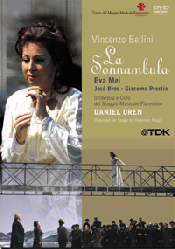The Royal Opera staged it a few years back, with Juan Diego Florez, (a reason for any bel canto revival) as Elvino. Santa Fe Opera put it on in 2004, for Natalie Dessay. And TDK has just released on DVD a January 2004 performance from Florence, with Eva Mei and Jose Bros.
Having seen the clumsy, occasionally ludicrous Sante Fe production, your reviewer can state that this Florence staging is better, but what a low standard to start from. Can the opera itself bear the blame? In the DVD booklet, Bellini is quoted as describing the audience at the opera’s premiere as not having a dry eye. Well, almost 175 years later, tears are unlikely to be produced by Romani’s depiction of an innocent young lady whose engagement to her beloved farmer/fiancé is threatened by her habit of sleepwalking. While Bellini’s music soars and sighs with the inner passions of the characters, the actual drama tends to psychologically naïve characterization and perfunctory plot complications (why does the Count have to pretend not to be the count?). No doubt, the opera poses many a challenge to stage directors.
Federico Tiezzi, director, and Pier Paolo Bisleri, set design, have created a visually arresting production, and the singers do their best to bring life to their characters. In the end, it doesn’t add up to much a success, but the effort can be appreciated.
A vivid green lawn and a house façade dominate act one. During the overture, Amina appears, curled up in a glaringly red sofa chair, which then disappears until the end of the opera, when Amina can safely curl up in it again for another nap. Has it all been a dream? Thankfully, that tired and ludicrous concept is not explicitly presented. Costumes for the ladies are of linen, for the most part, evoking an upper crust, early 20th century setting. Elvino, the gentleman farmer, and the Count, wear fine suits.
Somehow the beautiful spring or summer of act one regresses to a snowy cold winter scene for act two, and when Amina must suddenly appear for her narcoleptic foray, a metallic catwalk descends. So the production never comes together, with an idea here and another there that never add up to much, and with only the vaguest sense of time and place evoked. One innovation of this DVD set comes with the titles under the start of the overture, running across a series of illustrations based on the production, in the style of movie credits. Charming.
But bel canto should focus on canto, so how is this Sonnambula? The best performance in many ways comes from Gemma Bertagnolli as Lisa, the instigator and former love of Elvino whose jealousy of Amina propels the plot. A warm mezzo, Bertagnolli also has the gift of creating character by mean of her expressive face. Sadly, this production cuts Lisa’s aria, and the opera itself has no confrontation scene or true dramatic conclusion for the character.
Eva Mei meets the requirements of the role of Amina with a solid technique. She cannot do much to make Amina more than a rather tiring goody-two-shoes, but at least she doesn’t overdo the histrionics. Her big aria, Ah non credea mirarti, never takes flight, but never risks falling apart, either.
Jose Bros, the Elvino, seems to be the man to go to for these high-flying Bellini tenor roles; he also stars in the recent Puritani DVD with Gruberova. His acidic tone, though of a citric nature that may appeal to some, has a distinctive tang and easily cuts through ensembles. A simple but effective actor, he may not be an obvious choice for a man who has had the two beauties of the town fall for him, but it is a small village, after all.
Unfortunately, Giacomo Prestia as the Count has a vibrato-laden instrument without much attractive about it even when steady.
With few easily available alternatives, this Sonnambula will have its place for those burning with a desire to see the opera. For those with more patience, hold out hope that Dessay and Florez team up somewhere and that version makes it to market.
Chris Mullins
Los Angeles Unified School District, Secondary Literacy
